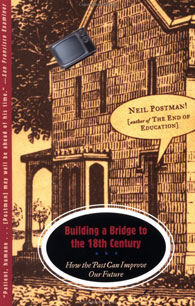 (Annotated audio recordings of this discussion appear further down.)
(Annotated audio recordings of this discussion appear further down.)
On the dedication page of “Building a Bridge to the 18th Century,” Neil Postman quotes the poet Randall Jarrell:
Soon we shall know everything the 18th century didn’t know, and nothing it did, and it will be hard to live with us.
Though often failing to provide satisfying answers, Postman asks the kind of first-order questions one hears all too infrequently at a time when technology’s impact on our social, political and intellectual lives grows ever more profound. Postman has been accused of deep reactionism toward technology, and indeed, his hostility toward computers and telecommunications betrays an elitism that discredits some of his larger, and quite compelling observations.
In spite of this, Postman’s diagnosis is persuasive: that the idea of technological progress bequeathed by the Enlightenment has detached from reason and become a runaway train, that we are unquestioningly embracing new technologies that unleash massive change on our family and communal life, our democracy, and our capacity to think critically. We have stopped asking the single most important question that should be applied to all new technological innovations: does this technology solve a problem? If so, then at what cost? To whose benefit? And at whose expense?
Postman portrays the contemporary West as a culture without a narrative, littered with the shards of broken ideologies – depressed, unmotivated, and therefore uncritical of the new technologies that are foisted upon it by a rapacious capitalist system. The culprit, as he sees it, is postmodernism, which he lambasts (rather simplistically) as a corrosive intellectual trend, picking at the corpse of the Enlightenment, and instilling torpor and malaise at all levels of culture through its distrust of language and dogged refusal to accept one truth over another. This kind of thinking, Postman argues, is seductive, but it starves humans of their inspiration and sense of purpose.
To be saved, he goes on, and to build a better future, we would do well to look back to the philosophes of 18th century Europe, who, in the face of surging industrialization, defined a new idea of universal rational humanism – one that allowed for various interpretations within its fold, was rigorously suspicious of religious or any other kind of dogma, and yet gave the world a sense of moral uplift and progress. Postman does not suggest that we copy the 18th century, but rather give it careful study in order to draw inspiration for a new positive narrative, and for a reinvigoration of our critical outlook. This, Postman insists, offers us the best chance of surviving our future.
Postman’s note of alarm, if at times shrill, is nonetheless a refreshing antidote to the techno-optimism that pervades contemporary culture. And his recognition of our “crisis in narrative” – a formulation borrowed from Vaclav Havel – is dead on.
September 19: Bob, Dan, Kim, and Ben discuss Postman’s book at our new Brooklyn office (special prize if you pick out the sound of the ice cream truck passing by).
1. Bob’s preface – thoughts about how we do business at the institute (1:56) (download)
2. Ben’s first impressions – childhood under threat… Dan’s first impressions into discussion – a Clinton-era book, sets up a rather straw man caricature with the postmodernists, but society’s need for a narrative is compelling – why the Christian right has done so well… Postman seems to be assuming that progress is a law, that there is a directed narrative to history – problems with how he treats evolution. (6:43) (download)
3. Bob: Postman is much better at identifying problems than at coming up with solutions. Which is what makes him compelling. His stance is courageous. People assume with technology that just because something can be done it should be done. This is a tremendous problem – an affliction. If you could go back in time and be the inventor of the automobile, would you do it? People get angry at the responsibility this question imputes to them. How can we put these big questions at the center of our work? (13:34) (download)
4. Another big question… “An electronic community is only a simulation of a real community”? Flickr, Friendster, Howard Dean campaign? What is the vehicle for talking about this? What format is best for engaging these questions? Looking for new forms that illuminate or activate the questions. (15:43) (download)
5. Where/who are the public intellectuals today? [The ice cream truck passes by.] Strange bifurcation of the intellectual elite – many of the best-educated people most able to deal with abstraction make their living producing popular media that controls society. (10:07) (download)
6. Is capitalism the problem? Postman’s bias: written language will never be surpassed in its power to deal with abstract thought and cultivation of ideas. But we are arguably past the primacy of print. What is our attitude toward this? (9:39) (download)
7. What opportunities for reflection do different media afford? Films on DVD can be read and reread like a book – the viewer controls, rather than being controlled – a possibility for reflection not available in broadcast. What is the proper venue for discussing this? Capitalism is the 800 lb. gorilla in the room. How do we create, if not a mass agitation, then at least a mass discussion? Tie it to the larger pressing problems of the world and how they will be better addressed by certain forms of discourse and reflection. Averting ecological catastrophe as one possible narrative – an inspiring motivator that will get people moving. How do find our way back into history? (10:09) (download)
8. What should we read next as counterpoint/antidote to Postman? The Matrix – are we headed that way? (12:33) (download)
9. How do we organize new kinds of debates about technology and society? Other issues to be addressed – class, race and gender inequality. (11:26) (download)
